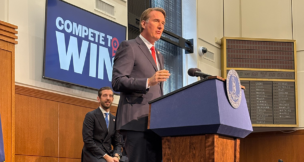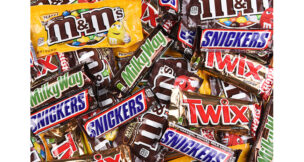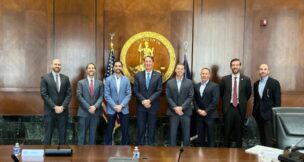Breaking rank
Kira Jenkins //July 28, 2022//
What a difference a year makes.
On July 13, 2021, against a backdrop of ships blasting their horns and spraying water in celebration at the Port of Virginia’s Norfolk International Terminals, Gov. Ralph Northam sat for a harborside interview with CNBC, which had just named Virginia the nation’s best state for business for an unprecedented second consecutive year. (Virginia previously won the No. 1 spot in CNBC’s America’s Top States for Business list in 2019; the cable business news network suspended the 2020 rankings due to the pandemic.)
“This is an exciting day for Virginia,” a grinning Northam said, going on to tout the state’s investment in the port’s infrastructure.
Exactly one year later, under new Republican Gov. Glenn Youngkin, the commonwealth presented a very different response after Virginia was bumped from the top spot by North Carolina, with CNBC ranking the Old Dominion as the nation’s No. 3 state for business in 2022.
There were no news releases sent out from the governor’s office recognizing the fact that coming in third out of 50 is still pretty darn good. Ditto, there were no kudos extended to our southern neighbor.
Instead, when asked by reporters about the rankings, Youngkin said, “I’m always so appreciative of Virginia receiving good accolades … [but] Virginia has not been performing like the best state for business.”
This isn’t a case of sour grapes on Youngkin’s part — it’s a consistent position.
During his campaign for governor, Youngkin downplayed Virginia’s No. 1 ranking, noting that Virginia’s pandemic job recovery numbers in late summer 2021 had placed it among the bottom five states. He’s also been critical of the cost of living and doing business in Virginia, as well as the fact that Virginia lags behind many other states in the availability of large, shovel-ready sites for larger economic development projects. (Incomplete site grading was cited as one factor for why Hyundai chose a site in Savannah, Georgia, for a $5.5 billion electric vehicle battery manufacturing plant in May instead of Pittsylvania County’s Southern Virginia Mega Site at Berry Hill.)
CNBC bases its rankings on 88 metrics, including workforce (the most heavily weighted category); education; cost of living; technology and innovation; and access to capital.
“A great education system is building a smart workforce,” CNBC said about Virginia this year, “but migration has slowed to a state where living costs are high.”
In terms of infrastructure, CNBC ranked Virginia ninth best in the nation, citing the commonwealth’s ongoing $3.8 billion Hampton Roads Bridge-Tunnel expansion, as well as the fact that 89.3% of Virginians have broadband access. (Also, just 4% of bridges and 13% of roads in Virginia are in poor condition, the network noted.)
Nevertheless, CNBC gave Virginia a D+ grade for cost of living and C+ grades for its economy and life, health and inclusion.
To his credit, Youngkin, former co-CEO of Washington, D.C., private equity firm The Carlyle Group, has said that as governor his priorities include job creation and lowering the costs of living and doing business in the commonwealth.
Responding to the CNBC rankings, Youngkin noted that Virginia jobs numbers improved dramatically during the first six months of his administration, and he touted economic development successes such as the June announcement that the Lego Group plans to build a $1 billion toy manufacturing plant in Chesterfield County. Yet, the governor distanced himself a bit from the factors that CNBC criticized, saying that while he’s working to improve the economy, his administration’s also “had to dig out of a hole” he inherited from Northam.
Meanwhile, Virginia Democrats issued a statement, claiming that Youngkin’s “culture war” and stances on issues such as abortion (the governor has proposed banning abortions after 15 weeks of pregnancy) “are driving business away” from Virginia. State Democrats also charged that Youngkin is too focused on his rumored interest in a 2024 presidential bid.
After just six months in office, though, it was probably still a little early for Youngkin to either take credit for the good or blame for the bad. And if Virginia politicos learned any lessons from former Gov. L. Douglas Wilder’s term, it is likely also far too soon to chase national ambitions.
e















